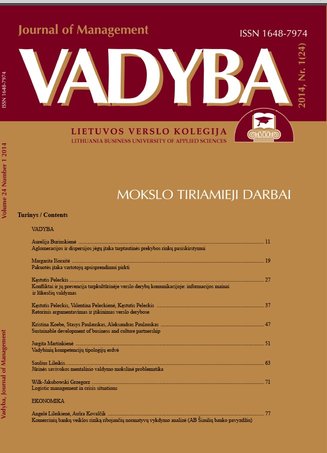STUDENTŲ, ABSOLVENTŲ IR DARBDAVIŲ POŽIŪRIO Į INFORMATIKOS KRYPTIES STUDIJŲ PROGRAMAS ANALIZĖ
ANALYSIS OF STUDENT’S, GRADUATES, PROGRAM DEVELOPERS AND EMPLOYER’S OPINION ABOUT AREA OF KNOWLEDGE IN INFORMATICS
Author(s): Eugenijus Valavičius, Sergėjus IvanikovasSubject(s): Christian Theology and Religion
Published by: Lietuvos verslo kolegija
Keywords: Computer science studies; informatics competencies; the change of competencies.
Summary/Abstract: This paper examines the changes of informatics (computer science) competency field, the problems of study program development or improvement. Lithuania and whole Europe encounter with the lack of specialists of information technologies. Gap between the number of free workplaces in IT business and the number of university graduates in informatics increases each year. Applications of Information Technology are evolving very rapidly, employers want a different application of knowledge and skills. The structure of informatics study program in Lithuania is defined by the Regulation of informatics study field (Lithuanian Ministry of Education and Science, 2008). The wishes of employers, the well-known recommendations of Association for Computing Machinery and the Institute of Electrical and Electronics Engineers „Computing Curricula“, situation in Labour Exchange have a significant impact too. Developers of informatics study program in Lithuania can use the methodics and results of recent surveys about the development of competences in informatics study field (Denisovas, 2011, Poviliūnas, 2010). Normative documents are aging rapidly, they need to be periodically updated. Study program developers have to be very careful distributing the study credits time between basic (fundamental) training and knowledge of specific applications in the field of informatics while creating a new study programs. There is a noticeable shift towards training of specific narrow competences (for example: „programming for smart devices“ instead of „general programming“, „cloud computing“ or „mobile networks“ instead of „computer networks“). Employers desire to train general competences (e.g. work in team, responsibility sense, problem solving competencies etc.). Number of students in groups is not big. This create a problem for optional (alternative) study courses. A case study was implemented to evaluate separate general and specific competencies of informatics (computer science) field. Vilnius Business College Computer science degree program, whose objectives and competencies are well enough to meet a variety of sources and advices, was selected for the case study. Study program has 4 general competencies (sense of initiative and entrepreneurship, ability to work in team etc.) and 8 professional competencies (ability to maintain hardware and software, object programming, databases, architecture of computer networks, computer graphics, web technologies, safety of information etc.). Competencies of this degree program were compared with the Regulations of Informatics study field, Computer Science Curricula 2013 (ACM/IEEE), reccomendations for development of informatics study field. Also study program competencies were evaluated by potential employers and college social partners, alumni and current students of informatics.
Journal: VADYBA
- Issue Year: 24/2014
- Issue No: 1
- Page Range: 135-141
- Page Count: 7
- Language: Lithuanian

